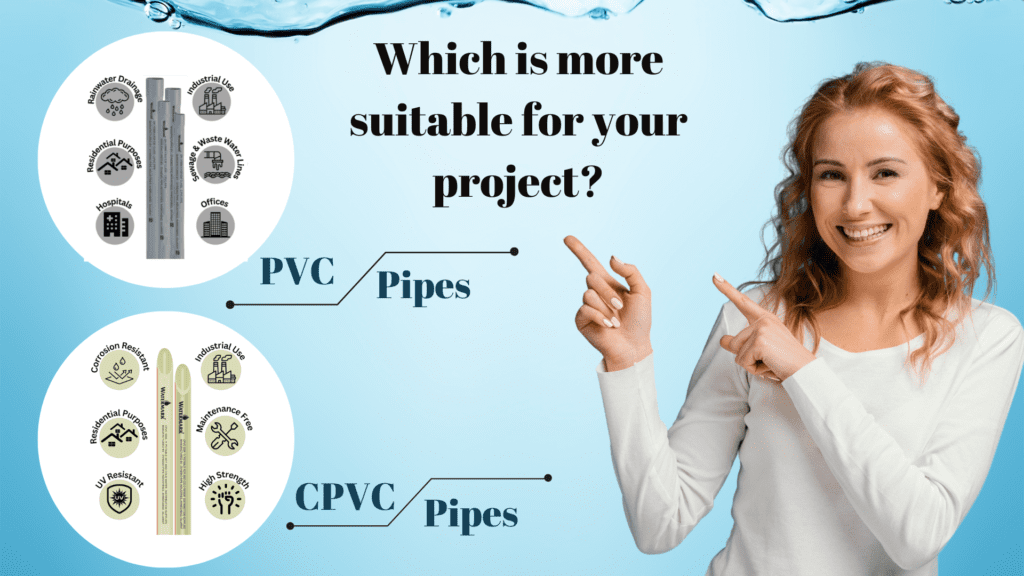Which is the better pipe, PVC or CPVC?
PVC and CPVC are two types of plastic piping that are widely used for many applications, from home plumbing and sewage lines to industrial applications. Both of these materials have beneficial properties and can be used in many different types of projects. However, there are some differences between the two products that should be taken into consideration when deciding which is better for a particular application.
PVC
PVC stands for polyvinyl chloride, and it is a plastic material produced from a combination of ethylene and chlorine. It is a very common type of piping, and it is usually produced in a white or off-white color. PVC is extremely resistant to corrosion, as it resists rust and oxidation, and it is also very durable, as it can handle temperatures up to 140°F. It offers superior sound insulation and is an inexpensive option for projects of all sizes. It is also highly flexible, making it easy to install and fit into tight spaces.
cPVC
CPVC, on the other hand, stands for chlorinated polyvinyl chloride. It is a hybrid of PVC and chlorinated polyethylene and is created by adding chlorine molecules to the vinyl molecules used in PVC production. CPVC piping is more rigid than PVC, and it is also more heat-resistant, as it can withstand temperatures up to 200°F. It also does not require the use of extra support for projects that are exposed to high pressure, as it is much more resistant to cracking and bursting. In addition, it is highly corrosion-proof, so it will not rust or corrode over time like other types of piping.
Which is more suitable for your project?

When it comes to deciding which type of piping is better, the answer often depends on the application. For large-scale projects, such as sewage and other water-supply installations, CPVC may be the better choice, due to its superior heat resistance and greater strength when under pressure. For small-scale projects, such as plumbing or regional water supply, PVC may be a better choice due to its flexibility, low price, and relative ease of installation.
In conclusion, when it comes to PVC vs. CPVC, both are beneficial materials that can be used for a variety of applications. However, the application should be the main factor when deciding which is better. CPVC may be the better choice for large projects because of its superior heat resistance and high strength under pressure.
Why choose PVC Pipe or CPVC Pipe?
When looking for a material to use for piping, there are a number of options to choose from. PVC (polyvinyl chloride) and CPVC (chlorinated polyvinyl chloride) are two of the most common materials and each has its own advantages and disadvantages to consider.
PVC is the most common choice for pipes due to its affordability, durability, and availability. It is one of the most cost-effective materials for piping needs, and can easily be found in most hardware stores and vendors. PVC is also lightweight and easy to work with, making it a great choice for both commercial and residential applications. It is also highly resistant to corrosion, meaning it will last for years without the need for repair or replacement. In addition, PVC is a non-toxic material, making it safe for use in any environment.
CPVC is a more recent development in the arena of piping material and offers several unique advantages over PVC. CPVC is more tolerant of higher temperatures than PVC and can be used to deliver hot liquids as well as cold. It is also more resistant to chemical corrosion than PVC, meaning it can handle more aggressive liquids and corrosion-causing agents. CPVC is also able to handle higher-pressure systems than PVC, making it ideal for high-pressure piping applications. Finally, CPVC is approved by the National Sanitation Foundation, which makes it a perfect choice for medical and food applications.
Which material is best?
When deciding between the PVC pipe and CPVC pipe, the needs of the project will ultimately decide which material is best. If the project is for a high temperature or pressure application, such as in plumbing for a boiler or materials transport, CPVC may be the best choice. If the pressures and temperatures are lower, or the application is for residential use, PVC will likely be the better material. However, the decision should be made on a case-by-case basis, as factors such as cost and the level of chemical or corrosive substances present can also have an impact on the best material choice.
In conclusion, PVC and CPVC are both popular pipe material choices, each offering its own unique advantages and disadvantages. Before making a decision, it is important to consider the needs of the application, taking into account temperature, pressure, corrosion, and cost. With the right material choice, any piping project can be completed to the highest standards and expectations.
If you’re looking for PVC Pipe or CPVC Pipe in India? Dynemo is one of the leading PVC, cPVC & uPVC pipe & fittings manufacturers throughout India, offering superior quality products made with state-of-the-art technologies and industrial standards.



